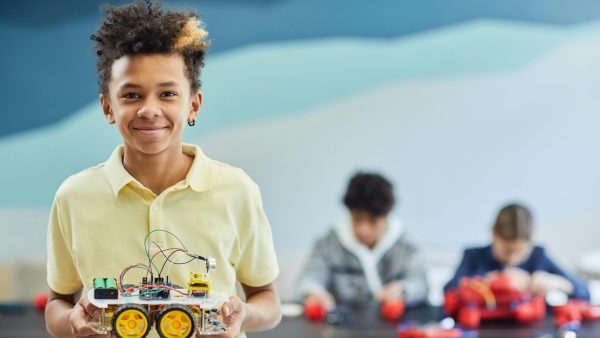Mimicking the human brain to help it learn. Computer systems emulate the way the brain acquires new knowledge and reasons. In this way, Artificial Intelligence helps us with languages or any other subject we want to learn.
If robots are able to learn new skills on their own, such as walking in different environments, and computer systems can develop machine learning algorithms without any human interference in the process, it is also possible that the same computer systems can help people acquire different skills.
In search of training
During the confinement experienced as a result of the coronavirus health crisis, the demand for online training in Spain sky-rocketed. As the Malaga-based company Vértice Elearning points out, the number of learners on its online platforms increased rapidly by more than 50 percent.
The training company has been able to establish a student profile that is largely female. The most predominant ages are between 25 and 34 and 45 and 54 years old; and the PC is the most used device.
Artificial Intelligence (AI) is closely related to learning. The reason?
One of the main areas of development of this technology is Neurolinguistic Programming, known by the PLN acronym, and it is the basis on which such useful and well-known tools as Siri, Telefónica’s Aura and other virtual assistants are developed. For these assistants (or chatbots) to work properly, they need to be built on a language model.
To develop a model, AI needs a large amount of data from which to learn. Thanks to data repetition, systems are able to see the relationship among that data and establish patterns. Therefore, when we do a Google search, the tool is capable of suggesting words and relating them to other searches. In the case of languages, the data are the words.
The most in demand: languages
English, German, French and Chinese were major protagonists during the confinement, according to the online training platform 8Belts. Language competence improvement has been one of the skills that has aroused the most interest in the last year and a half, especially regarding English, perhaps because this language still eludes Spaniards.
Connectivity has enabled thousands of people to improve their skills in different subjects, and online training has helped the development of learning, with technology playing a key role in meeting these needs. AI and Machine Learning offer methodologies that adapt to the level of each student and, based on said level, they can design an itinerary to suit their individual objectives.
Online training platforms even make it possible to maintain a demand level that fits the learning pace of each person, so that the student feels “challenged” and can maintain an optimum level of interest and involvement in what they are learning.
In this sense, gamification is a very effective tool for learning not only languages, but also any subject one wishes to study. It allows pupils to have fun while acquiring new knowledge, encourages interest and curiosity so that they themselves advance their knowledge and want to continue to expand it.
AI against exclusion in education
As highlighted by the UNESCO, this technology can develop innovative learning tools and practices which are much-needed to achieve the Sustainable Development Goal (SDG) number four: “ensure inclusive and equitable quality education and promote lifelong learning opportunities for all”.
However, the rapid advancement of new technologies brings its risks and challenges along with it, and it is necessary to ensure that the use of innovations such as AI in the educational context is inclusive and equitable.
In this sense, the international organisation works to ensure that the benefits of this technology in terms of innovation and knowledge are accessible to everyone, adopting a human-centred approach and combating inequalities in terms of access to knowledge, to research and to diverse cultural expressions.







